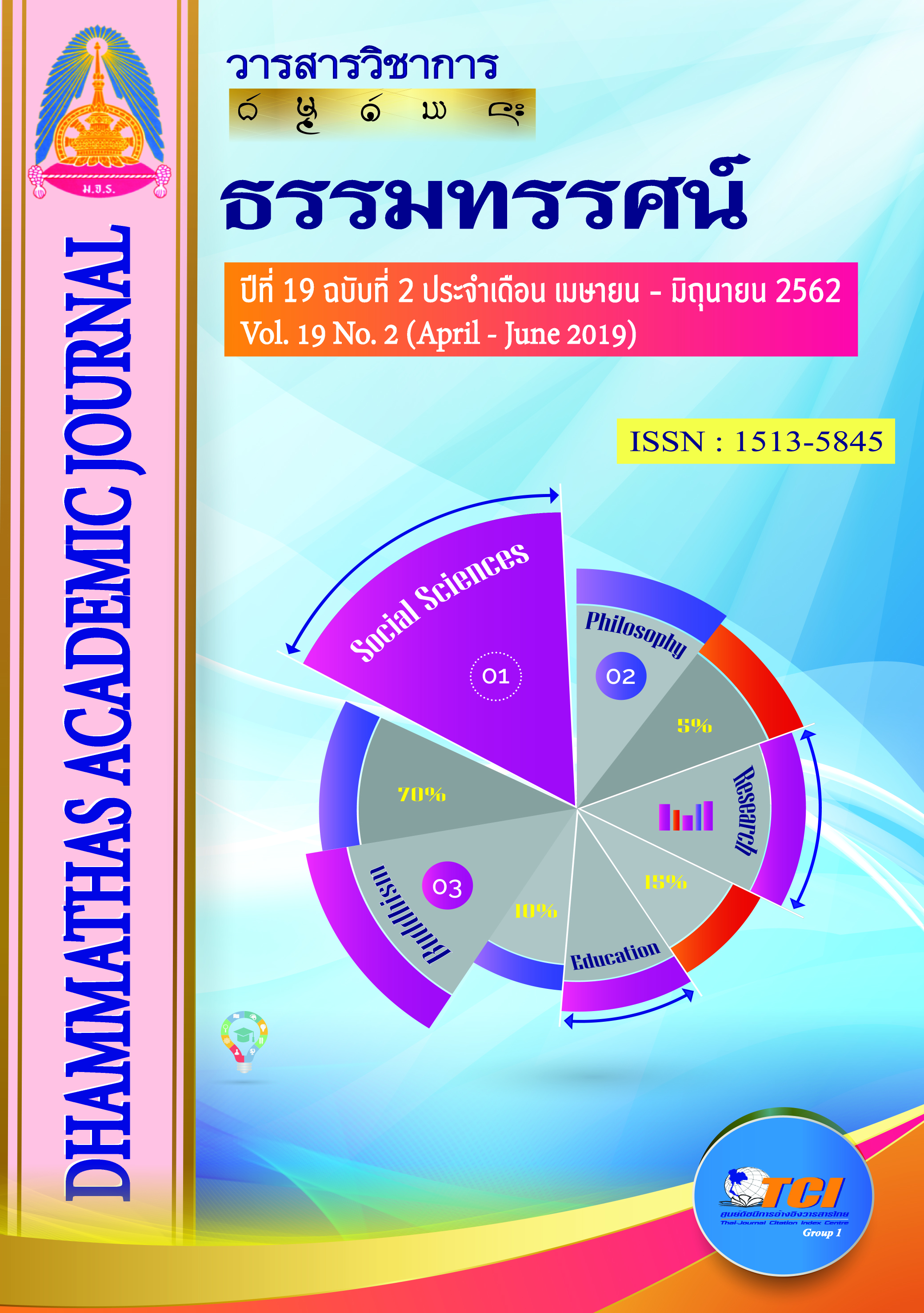การพัฒนาความฉลาดทางอารมณ์ตามหลักไตรสิกขาของนักเรียนโรงเรียนประถมศึกษา สังกัดสำนักงานเขตพื้นที่การศึกษา ประถมศึกษาศรีสะเกษ เขต 1
Main Article Content
บทคัดย่อ
การวิจัยครั้งนี้ มีวัตถุประสงค์เพื่อ 1) ศึกษาอารมณ์และหลักไตรสิกขาในพระพุทธศาสนา 2) เพื่อวิเคราะห์ความฉลาดทางอารมณ์ตามหลักไตรสิกขา และ 3) เพื่อพัฒนาความฉลาดทางอารมณ์ตามหลักไตรสิกขาของนักเรียนโรงเรียนประถมศึกษาสังกัดสำนักงานเขตพื้นที่การศึกษาประถมศึกษาศรีสะเกษเขต 1 กลุ่มประชากรเป้าหมายเป็นนักเรียนที่ได้มาจากการประเมินความฉลาดทางอารมณ์ ที่มีระดับคะแนนที (T-Score Norms) ต่ำกว่า 49 ลงมา จำนวน 45 คน ในปีการศึกษา 2559 ซึ่งได้มาแบบเจาะจง เครื่องมือที่ใช้ในการวิจัยประกอบด้วย 1) กิจกรรมพัฒนาความฉลาดทางอารมณ์ด้านศีล ด้านสมาธิและด้านปัญญา 2) แบบประเมินความฉลาดทางอารมณ์ ของเด็กอายุ 6-11 ปี ของกรมสุขภาพจิต สถิติที่ใช้ในการวิจัยได้แก่ค่าเฉลี่ยและร้อยละแล้วนำเสนอผลการวิจัย ด้วยการวิเคราะห์เชิงพรรณา
ผลการวิจัยพบว่า อารมณ์ หมายถึงขออมูลทางประสาทสัมผัส (Sense Data) หรือวัตถุแห่งการรับรู้ทางตา หู จมูก ลิ้น กาย ใจ ที่ส่งผลต่อพฤติกรรม และการตอบสนองต่อ สิ่งเร้าต่างๆ ที่ผ่านเข้ามาทางประสาทสัมผัสหรือที่เรียกว่า “อายตนะภายนอก”ส่งผล ต่อลักษณะของเวทนาหรือความรู้สึกต่อการกระทบสัมผัสจากอารมณ์หรือสิ่งเร้าภายนอกส่วนไตรสิกขา แปลว่า สิกขา 3 หมายถึง ข้อสำหรับศึกษาการศึกษาข้อปฏิบัติที่พึงศึกษา การฝึกฝนอบรมตน 3 อย่างคือ อธิสีลสิกขา คือ ศึกษาเรื่องศีล อบรมปฏิบัติให้ถูกต้องดีงาม อธิจิตตสิกขา คือศึกษา เรื่องจิต อบรมจิตให้สงบมั่นคงเป็นสมาธิและอธิปัญญาสิกขา ศึกษาเรื่องปัญญาอบรมตนให้เกิดปัญญาแจ่มแจ้ง
การพัฒนาความฉลาดทางอารมณ์ตามหลักไตรสิกขา คือ การพัฒนากระบวนการรับรู้อารมณ์มี 5 ขั้นตอนดังนี้ 1) ขั้นผัสสะ หมายถึง การกระทบ การถูกต้องที่ให้เกิดความรู้สึก เป็นความประจวบกันแห่งสามสิ่ง คือ อายตนะภายในอายตนะภายนอกและวิญญาณ 2) เวทนา คือ การเสวยอารมณ์ความรู้สึกที่เกิดขึ้นจากการผัสสะ 3) ขั้นจดจำข้อมูลได้แก่ สัญญาเป็นขั้นที่เกิดการรู้จำในสิ่งที่มากระทบสัมผัส การจำได้หมายรู้ในอารมณ์ลักษณะต่างๆ 4) ขั้นปรุงแต่งอารมณ์ (เวทนา) ได้แก่ สังขาร หมายถึง การนึกคิดทางใจ เป็นพลังหรือแรงขับปรุงแต่งจิตให้คิดดี คิดชั่ว หรือเป็นกลางๆ ไม่ดี ไม่ชั่ว เป็นขั้นที่ข้อมูล จะถูกส่งไปวิเคราะห์ที่ส่วนของความจำหมาย (สัญญา) เมื่อรู้ว่าเป็นอะไร จิตจะสร้างเจตสิกขึ้นมารับผัสสะนั้นในรูปของความรู้สึก เมื่อเกิดความรู้สึก ก็จะเกิดการปรุงแต่งเป็นกิเลสตัณหาต่อไป 5)ขั้นวิเคราะห์และสังเคราะห์อารมณ์ เป็นการที่จิตบูรณาการข้อมูลความรู้ที่ได้รับทั้งหมดจากทุกภาคส่วนของความรู้ที่เกิดขึ้นจากการรับรู้และแหล่งของการเรียนรู้ต่างๆ แล้วส่งผลให้จิตสังเคราะห์การรับรู้ที่เกิดขึ้นตามความเข้าใจ
ผลการพัฒนาความฉลาดทางอารมณ์ตามหลักไตรสิกขาของนักเรียน โรงเรียนประถมศึกษาสังกัดสำนักงานเขตพื้นที่การศึกษาประถมศึกษาศรีสะเกษเขต 1 ได้แก่ ผลการพัฒนาความฉลาดทางอารมณ์ด้านศีลส่งผลให้นักเรียน มีระเบียบวินัย สำรวมกายและวาจา ไม่เบียดเบียนผู้อื่น มีสัมมาคาระ มีจิตสาธารณะช่วยเหลือผู้อื่น มีความพร้อมในการเรียน มีความรับผิดชอบต่อหน้าที่ที่ได้รับมอบหมาย สามารถปฏิบัติหน้าที่ด้วยตนเองโดยไม่ต้องมีครูมากำกับดูแล ผลการพัฒนาความฉลาดทางอารมณ์ด้านสมาธิ นักเรียนมีสมาธิดีขึ้น นิ่งไม่วอกแวก มีความเพียรพยามยามในการทำงานเพิ่มขึ้น ตั้งใจเรียนมีสมาธิในการเรียน มีความเข้มแข็งทางอารมณ์ ทำงานที่ครูมอบหมายได้ถูกต้องและส่งทันตามกำหนดเวลา ส่วนผลการพัฒนาความฉลาดทางอารมณ์ด้านปัญญา นักเรียนมีความตั้งใจในการเรียนและมีทักษะในการคิดเพิ่มขึ้น มีคุณลักษณะที่พึงประสงค์ดีขึ้นทุกข้อและยังพบว่าผลการทดสอบระดับชาติขั้นพื้นฐาน (O-NET) ในปีการศึกษา 2559 สูงขึ้นทุกรายวิชา รายวิชาที่มีคะแนนพัฒนามากที่สุด คือ วิชาภาษาไทย คะแนนพัฒนา เท่ากับ 18.53 รองลงมาคือรายวิชาภาษาอังกฤษ คะแนนพัฒนา เท่ากับ 12.64 และรายวิชาที่คะแนนพัฒนาต่ำสุดคือรายวิชาวิทยาศาสตร์ เท่ากับ 1.19 และผลสัมฤทธิ์ทางการเรียนระดับโรงเรียนก็สูงขึ้นเช่นกัน

